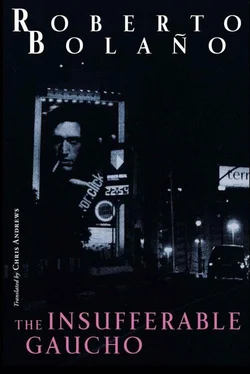Rousselot then visited the publishers of The Juggler’s Family (which Morini, it seemed, had never read) and made a half-hearted attempt to obtain the address of the translator they had employed, hoping that he would be able to put him in touch with the translators of Nights on the Pampas and Life of a Newlywed . This second publishing house was significantly smaller and seemed to be run by just two people: the woman who received Rousselot, whom he guessed was a secretary, and the publisher, a young guy, who greeted him with a smile and a hug, and insisted on speaking Spanish, although it was soon clear that his grasp of the language was tenuous. When asked why he wanted to speak with the translator of The Juggler’s Family , Rousselot was at a loss for words, because he had just realized how absurd it was to think that any of his translators would be able to lead him to Morini. Nevertheless, encouraged by the publisher’s warm welcome (and his readiness to listen, since he didn’t seem to have anything better to do that morning), Rousselot decided to tell him the whole Morini story, from A to Z.
When he had finished, the publisher lit a cigarette, and paced up and down the office for a long time in silence, from one wall to the other and back, a distance of barely three yards. Rousselot waited, becoming increasingly nervous. Finally the publisher stopped in front of a glass-fronted bookcase full of manuscripts and asked Rousselot if it was his first time in Paris. Rather taken aback, Rousselot admitted that it was. Parisians are cannibals, said the publisher. Rousselot hastened to point out that he was not intending to take any kind of legal action against Morini; he only wanted to meet him and perhaps ask him how he’d come up with the plots of the two films in which he, Rousselot, had, so to speak, a particular interest. The publisher burst into uproarious laughter. It’s all about money here, he said, ever since Camus. Rousselot looked at him, bewildered. He didn’t know whether the publisher meant that idealism had died with Camus, and money was now the prime concern, or that Camus had established the law of supply and demand among artists and intellectuals.
I’m not interested in money, said Rousselot quietly. Nor am I, my poor friend, said the publisher, and look where it’s got me.
They parted with the understanding that Rousselot would call the publisher and arrange to have dinner one night. He spent the rest of the day sightseeing. He went to the Louvre and the Eiffel Tower; he ate in a restaurant in the Latin Quarter, and visited a couple of secondhand bookshops. That night, from his hotel, he called an Argentine writer he had known back in Buenos Aires and who now lived in Paris. They weren’t exactly friends, but Rousselot admired his work and had been instrumental in getting a number of his pieces published in a Buenos Aires magazine.
The Argentine writer was called Riquelme and he was happy to hear from Rousselot. Rousselot wanted to arrange to meet up some time during the week, perhaps for lunch or dinner, but Riquelme wouldn’t hear of it and asked him where he was calling from. Rousselot told him the name of his hotel and mentioned that he was thinking of going to bed. Riquelme said, Don’t even think of getting into your pajamas, I’ll be right there; it’s my treat tonight. Rousselot was overwhelmed, powerless to resist. He hadn’t seen Riquelme for years, and, waiting in the hotel lobby, tried to remember what he looked like. He had blond hair and a round, broad, face with a ruddy complexion; he was short. It had been a while since Rousselot had read any of his work.
When Riquelme finally appeared, Rousselot hardly recognized him: he seemed taller, not so blond, and he was wearing glasses. The night was rich in confessions and revelations. Rousselot told his friend what he had told his French publisher that morning, and Riquelme told Rousselot that he was writing the great Argentine novel of the twentieth century. He had passed the 800-page mark, and hoped to finish it in less than three years. Although Rousselot prudently refrained from asking about the plot, Riquelme explained several sections of his book in detail. They visited various bars and clubs. At some point during the night, Rousselot realized that both he and Riquelme were behaving like adolescents. At first this embarrassed him, but then he surrendered to the situation, happy to know that his hotel was there at the end of the night, his hotel room and the word “hotel,” which in that instant seemed a miraculous (that is to say instantaneous) incarnation of risk and freedom.
He drank a lot. On waking, he discovered a woman beside him. The woman’s name was Simone and she was a prostitute. They had breakfast together in a café near the hotel. Simone like to talk, so Rousselot discovered that she didn’t have a pimp, because a pimp will always rip you off, that she had just turned twenty-eight, and that she liked watching movies. Since he wasn’t interested in the world of Parisian pimps and Simone’s age didn’t seem a fruitful topic of conversation, they started talking about movies. She liked French cinema, and before long they got onto Morini. His first films were very good, in Simone’s opinion. Rousselot could have kissed her when she said that.
At two in the afternoon they returned to the hotel and didn’t re-emerge until dinner time. It would probably be true to say that Rousselot had never felt so good in his life. He wanted to write, and eat, and go out dancing with Simone, and wander aimlessly through the streets of the Left Bank. In fact, he felt so good that during the meal, shortly before they ordered dessert, he explained the reason for his trip to Paris. To Rousselot’s surprise, Simone was not at all surprised by the revelation that he was a writer or that Morini had plagiarized or copied his work, or freely adapted two of his novels to make his two best films.
Things like that do happen, was her laconic response, and even stranger things. Then, point blank, she asked him if he was married. The answer was implicit in the question, and with a resigned gesture Rousselot showed her the gold ring constricting his finger in that moment as it never had before. And do you have children? asked Simone. A little boy, said Rousselot with a tenderness engendered by the mental image of his offspring. And he added, He looks just like me. Then Simone asked him to keep her company on the way home. In the taxi, neither of them said a word; both looked out of their windows at the unpredictable spills of bright and dark, which made the City of Light seem like a medieval Russian city, or at least like the images of such cities that Soviet directors used to offer for public consumption every now and then in their films. Finally the taxi pulled up in front of a four-story building and Simone invited him to come in. Rousselot wondered whether he should, and then he remembered that he hadn’t paid her. Shamefaced, he got out of the taxi without worrying about how he would get back to his hotel (there didn’t seem to be many taxis in that neighborhood). Before going into the building, he held out a bunch of uncounted bills, which Simone put into her handbag, without counting them either.
The building didn’t have an elevator. By the time they reached the fourth floor, Rousselot was out of breath. In the dimly lit living room an old woman was drinking a whitish-colored liqueur. In response to a sign from Simone, Rousselot sat down next to the old woman, who produced a glass and filled it with that appalling liquid, while Simone vanished through one of the doors, then reappeared after a while and summoned him with a gesture. What now? thought Rousselot.
The room was small; it contained a bed in which a child was sleeping. My son, said Simone. He’s lovely, said Rousselot. And he was a pretty child, but perhaps that was only because he was sleeping. He had blond hair, which was rather too long, and resembled his mother, although Rousselot noted that there was already something thoroughly manly about his childish features. When he went back to the living room, Simone was paying the old woman, who then took her leave of Madame, and even wished her visitor an effusive good night, calling him Sir . Rousselot was thinking that the day had been eventful enough and that it was time to leave when Simone said he could spend the night with her, if he liked. But you can’t sleep in my bed, she said; she didn’t want her son to see her in bed with a stranger. So they made love in Simone’s room, and then Rousselot went out into the living room, lay down on the couch and fell asleep.
Читать дальше












